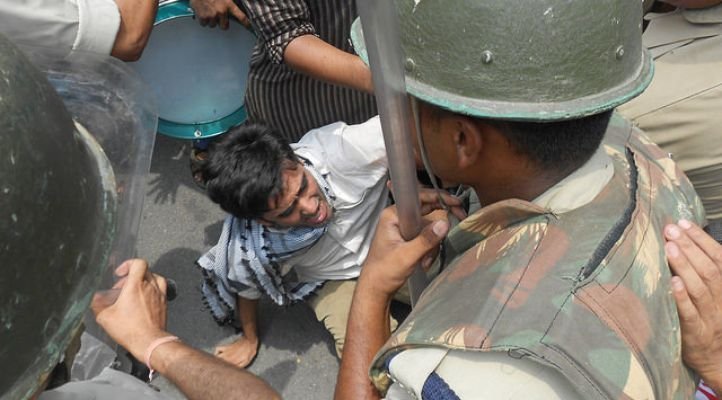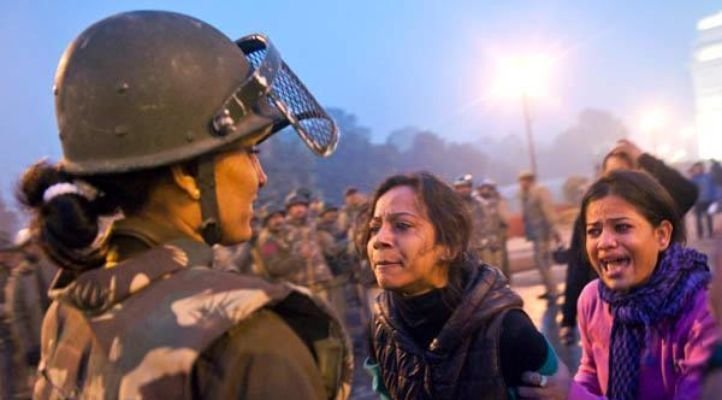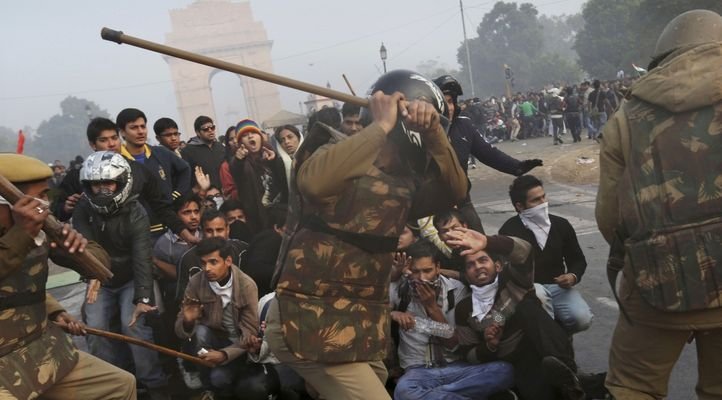The Indian Express recently reported a case of extreme police brutality. A prosecution witness in a case involving three bombings in Mumbai recently told a special court that the police tortured him while he was in their custody.
The witness’ statement reads, “I was made to drink gutter water and urine… It is correct that I was asked to drink urine of another accused and my urine (was given) to him”. The statement further reads hat they were forced to have sex with stray dogs and were regularly beaten. The police have, of course, denied such allegations.
What does this say of the police force in our country. What does this say of the country’s publicly appointed guardian of order. The very people who are expected to protect us are the ones who torture us.

This is not the first time Indians have come across horrific incidents of police brutality. There have been numerous cases where the police have shown no remorse in either beating, torturing or even raping citizens.
In 2003, there was a brutal incident against Adivasi’s known as the Muthanga incident . The police brutally attacked a group of Adivasis who had gathered under Adivasi Gothra Mahasbha (AGM) in protest to the Kerala government’s delay in allotting them land. Two fatalities were officially reported, although the eventual figure was 5. More than 15 Adivasis were fatally wounded.
The 2011 Forbesganj firing was an act of state brutality in which four villagers were killed near Forbesganj, in Bihar. An inquiry into the incident suggested the role of BJP politicians in the killings. The villagers were protesting the grant of land to a factory owned by a son of BJP politician Ashok Agarawal.
In 2014 a woman was gang raped by four police men inside a police station in Uttar Pradesh. She had gone to the station to find out the reason behind her husbands arrest.
On April 7, 2015 an incident now known as the Andhra shootout resulted in wide spread protests around Tamil Nadu. Andhra Pradesh police shot and killed 20 workers – a number of whom belonged to Tamil Nadu – because they suspected them of being red sandalwood smugglers.
The most recent case happened on April 28, where a model was raped by a policeman as well as extorted for money. She was also accused of being a prostitute and manhandled by the police forces.
Around the world and back again
Some may argue that developing countries have a tendency to allow a certain level of leeway when it comes to police force. However, numerous incidents of brutality in the United States point to the contrary.
The most recent of which is the Freddie Gray death, which resulted in the Baltimore riots. Freddie Gray was arrested by the police and died in the custody, neither the State nor the police force can understand why.
What exactly happened to Freddie Gray? An officer made eye contact with Gray. For some unknown reason Gray ran. The officer and his partner then detained Gray. They found a switchblade in his possession. They arrested Gray as he screamed in pain. Within an hour, his spine was almost completely severed. A week later, he was dead.
All this is to say that something seriously needs to be done about State brutality. In India the Indian police comes under the purview of the state government. Under the Police Act of 1861, which is still in force, the police are nothing more than a government department lacking the autonomy under rule of law that exists in other democracies.
No doubt the Constitution of India is the supreme law of the land but the police are governed by the repressive 1861 Police Act and the regressive Indian Penal Code (IPC) and Criminal Procedure Code (CrPC) in their day-to-day operations. Indictment of the police in India must thus be taken as an indictment of the government in India, both central and state.
Why do abuses persist?
Part of the problem is the working conditions of the police force. The civil police live and work in abysmal conditions. First and foremost, there are not enough police officers on duty. This means, officers are often exhausted and demoralised for constantly being on call, working long hours without shifts and necessary equipment.
Junior ranking officers often face unrealistic demands from their seniors for solving cases quickly. Even if officially encouraged, their use of professional crime investigation techniques is effectively discouraged by the dearth of time, training and equipment. Local political figures frequently intervene in investigations and sometimes act to protect known criminals.

To get around these systemic problems, many officers take ‘short cuts’: refusal to register complaints; illegal detention, torture and ill-treatment of alleged criminals; eliciting of confessions known to be false. This results in a climate of fear in which Indians actively avoid the police. A vicious cycle is then created, where crimes go unreported and unpunished and the pressure mounts on the police to control the rising criminality.
Recommendations for police reform
There are a multitude of recommendations for police reform that have been highlighted by various reports. Amongst them there are a few in particular that the author considers most important, by way of impact/effectiveness.
First, there should be a separation between crime investigation and the departments of law and order. It is necessary to have an institutional linkage between the two, but crime investigation is about gathering and sifting through evidence. It should be treated as a quasi judicial function, and be lead by an autonomous and accountable body.
Second, and this is extremely important, there have to be checks and balances. An autonomous, rogue police force will be a complete disaster. There has to be some sort of an institutional mechanism that ensures accountability.

The third point on this list is police personnel. There has to be a drastic shift in terms of those hired in investigation units, as constables and junior officers. There has to be a 50% rise in the police force. There are about 130 police for every 100,000 citizens as of 2011. The number of female officers has to increase. These changes will result in a dramatic change in the functioning of the force. At the moment the police is overburdened due to the lack of officers.
Lastly, much like the American system, there should be a separate prosecution branch at the district level. This should be headed by a District Attorney, appointed by the judiciary, with a tenure of 5 years. All persecution and investigation should come under the DA’s purview. This will ensure autonomy, efficiency, protection of human rights and better coordination with criminal courts.
At the end of the day the police exist only to protect the citizens. They are around to ensure that civil society upholds the law, that order exists over chaos. Without the police, society would turn to anarchy, there would be a citizen militia and law and order would be distant memory. This is not to say that the police can be excused of their brutality. It is only to suggest that we have the ways and means to ensure no one can be tortured the way the Mumbai bombings witness was.

















